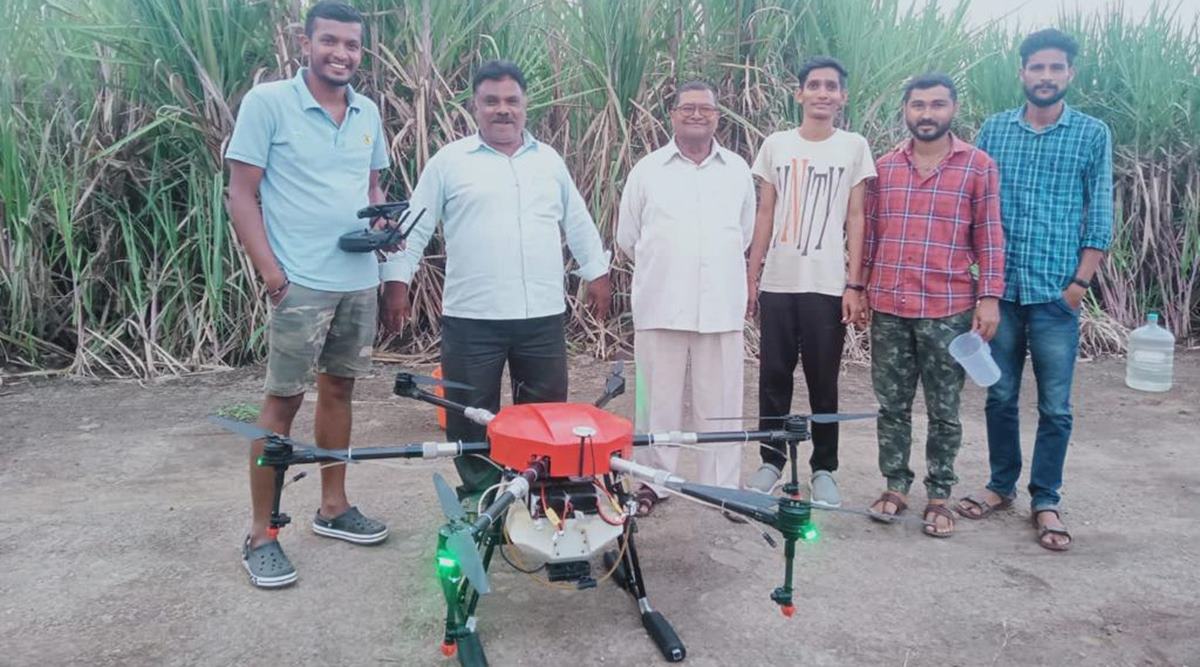 Swapnil Walwekar (extreme left) with his drone. (Express Photo)
Swapnil Walwekar (extreme left) with his drone. (Express Photo)Sharad Awati, a farmer from Maharashtra’s Sangli district, would usually employ around eight men to spray growth promoters over four acres of his sugarcane field. It would take them an entire day. This time, he decided to hire a drone from an entrepreneur, Swapnil Walwekar.
Awati, from Asta village in Walwa taluka, said this decision not only reduced spraying time considerably but also saved him money. “Overall, it took just two hours to finish the job. Also, usage of the chemical was less,” beamed the farmer, whose family grows cane over eight acres. “If we had to employ manual labour, the total cost of spraying an acre comes close to around Rs 780, while drone operators charge Rs 700 per acre.”
A year after the Union government allowed the use of drones for agricultural activities, many input and seed companies are gearing up to ensure that these machines are customised for the sector. In rural Sangli, a silent revolution is already underway, with canegrowers extending an enthusiastic welcome to the new technology. Originally started by the Rajarambapu Patil Cooperative Sugar Mill, drone services in this area are now being offered by individual entrepreneurs like Walwekar for spraying of pesticides, insecticides, weedicides and growth promoters.
The early results seem to bode well for the adoption of this technology.
Ramchandra D Mahuli, managing director of the mill (which, incidentally, is managed by the family of senior NCP MLA Jayant Patil), said they decided to experiment with the technology in 2020. Back then, the mill invested in a drone and sent a staffer to get trained in its operation. Before hitting the market, the drone was experimented on the seed plots and nurseries maintained by the mill. “It was only in December 2020 that we decided to open this service for our farmers after we were convinced that this technology will be beneficial for them,” he said.
Operations, Manhuli explained, were not difficult. The farmer provides the chemical and the mill sends the drone to the field with a “pilot” and “co-pilot”. The co-pilot feeds in the coordinates into the drone, the sprayer is fitted with a mixture of the desired chemical with 10 litres of distilled water — and the operation starts. “With a single battery charge, we can spray between 15-26 acres. Our drone can finish spraying an acre in four minutes,” said Manhuli.
Sujaykumar Patil, the cane development officer of the mill, said their experiments have shown that spraying by drone can start on crops after 90 days of planting. Other than time, application of drones also results in 50 per cent saving of inputs. “For mature crops, drones are the best option — manual labour can’t reach the tops to spray in case of woolly aphids, which is a major concern this season,” he said.
At present the mill has four drones in operation. It has sprayed around 12,00 acres till date. Other than Sangli, the mill has also received enquiries for spraying from Kolhapur, Solapur and Pune. “For our farmers, we charge at the rate of Rs 600/acre and if we have to travel outside we charge Rs 700/acre,” said Patil.
Walwekar, whose family grows cane over 12 acres in Bhilawadi village in the neighbouring Palus taluka of the district, invested Rs 6 lakh to procure a drone two months back. A graduate in agricultural science, Walwekar said requests are pouring in from farmers. “In the last month or so I have sprayed around 200 acres — the demand is more than I can cater.”
And farmers confirm this. “The saving of time and chemicals is perhaps the most attractive feature which draws us to this,” said Awati.